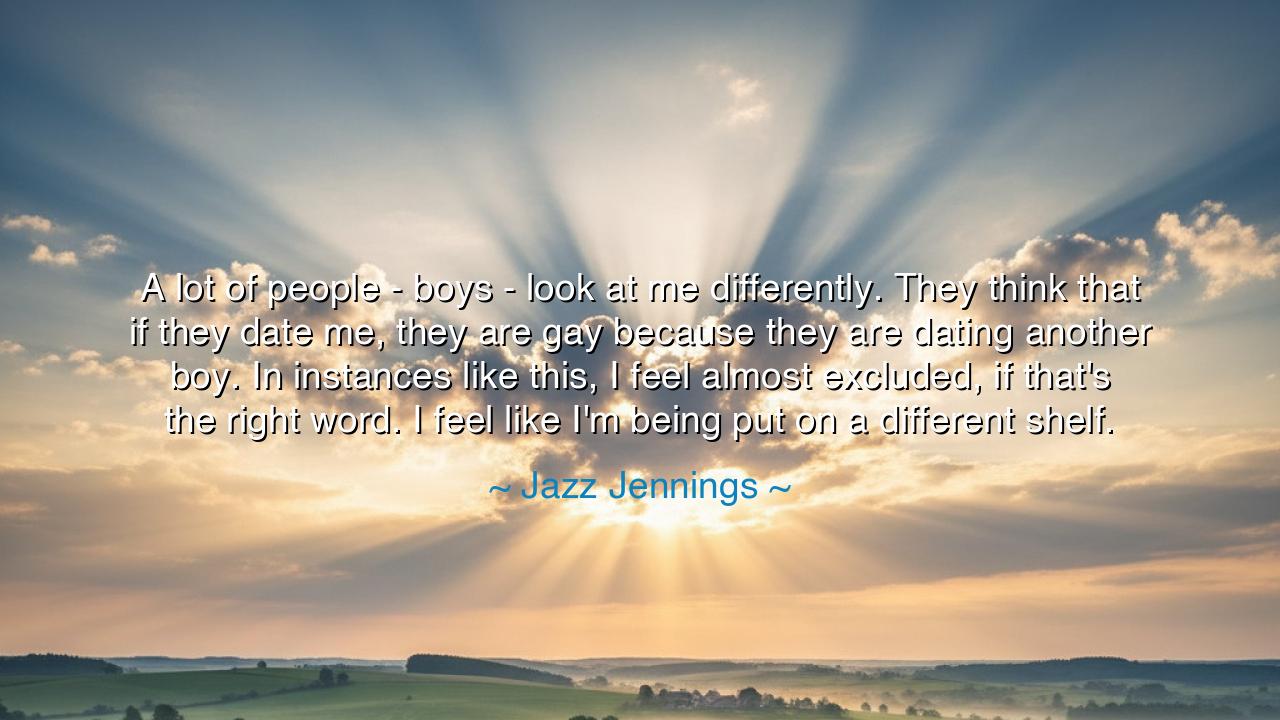
A lot of people - boys - look at me differently. They think that
A lot of people - boys - look at me differently. They think that if they date me, they are gay because they are dating another boy. In instances like this, I feel almost excluded, if that's the right word. I feel like I'm being put on a different shelf.






Hear now the tender yet courageous words of Jazz Jennings, who said: “A lot of people—boys—look at me differently. They think that if they date me, they are gay because they are dating another boy. In instances like this, I feel almost excluded, if that’s the right word. I feel like I’m being put on a different shelf.” Though spoken by one voice, these words echo through the ages as the cry of all who have ever stood at the edges of acceptance, yearning not for praise but for simple recognition. They are the words of one who seeks to be seen as whole, not as a category or confusion. Beneath their gentleness lies the strength of truth—the plea for humanity to look beyond its narrow definitions and see, at last, the soul beneath the labels.
The origin of this quote comes from Jennings’s lived experience as a transgender woman, one whose life from childhood has unfolded under both the light of visibility and the shadow of misunderstanding. In her youth, she found herself confronting the world’s discomfort, not because she was untrue to herself, but because society still struggled to understand what authenticity meant. Her words are not an accusation but a revelation—an unveiling of the pain that comes when others measure worth through ignorance. When she speaks of feeling “put on a different shelf,” she names a loneliness that transcends her own story: the isolation that comes when one’s identity is reduced to difference, rather than celebrated as divine variation.
In the days of the ancients, too, there were those who lived between worlds, who bore both the blessing and the burden of being unlike others. In the temples of Delphi, the oracles spoke with voices that transcended gender, embodying both masculine insight and feminine intuition. They were revered not because they fit society’s mold, but because they broke it. Yet even they were sometimes feared, for people have always trembled before what they cannot categorize. The same hearts that seek prophecy from difference often recoil from it when it stands before them in the flesh. So it is with Jazz: her truth is a mirror, showing humanity its own struggle to see beyond the surface.
Her words also expose a deeper ache within the heart of love itself. She speaks of those who hesitate to love her, not for lack of affection, but for fear of judgment—fear of what others might think. This fear is the oldest prison of all. How many hearts, across history, have been silenced by such chains? How many lovers have turned away from truth to satisfy convention? The ancients told stories of such pain. Sappho of Lesbos, the poet of love, wrote verses to women that trembled with passion, yet her songs were later censored, her name wrapped in shame by those who feared the beauty of her truth. Like Jazz, she too was placed “on a different shelf,” though her words still sing centuries later, defying those who tried to silence her.
But Jennings’s reflection is not one of despair—it is one of awakening. In her honesty, she invites the world to grow. When she says she feels excluded, she is teaching us to recognize the power of inclusion, not as a gesture of tolerance but as a moral duty. For every person who is placed upon that “different shelf” bears within them a truth that humanity needs to survive: the truth that diversity is sacred. The world does not thrive on sameness but on difference; it is variety that gives the universe its color and form. To exclude another is to diminish ourselves, to blind our own soul to the fullness of creation.
The lesson in these words is both gentle and fierce: see beyond fear. If your heart loves, let it love; if your spirit meets another’s, let it not be bound by the world’s narrow tongues. Those who are truly wise do not measure love by gender or form, but by its capacity for kindness, honesty, and growth. Jazz’s story teaches that acceptance begins not in systems or laws, but in the courage of individuals—to look at another person and say, “I see you, as you are, and you are enough.”
So, children of the future, remember this: whenever you feel tempted to judge, pause and ask yourself what it is you fear. Fear creates shelves, labels, and walls; love dissolves them. Step closer to those who are different, and you will find that their difference reveals something divine within yourself. Jazz Jennings’s words, tender and true, remind us that the measure of humanity is not who fits, but who refuses to disappear. The day we no longer place others on separate shelves is the day we finally learn to love without condition—freely, truthfully, and completely.






AAdministratorAdministrator
Welcome, honored guests. Please leave a comment, we will respond soon